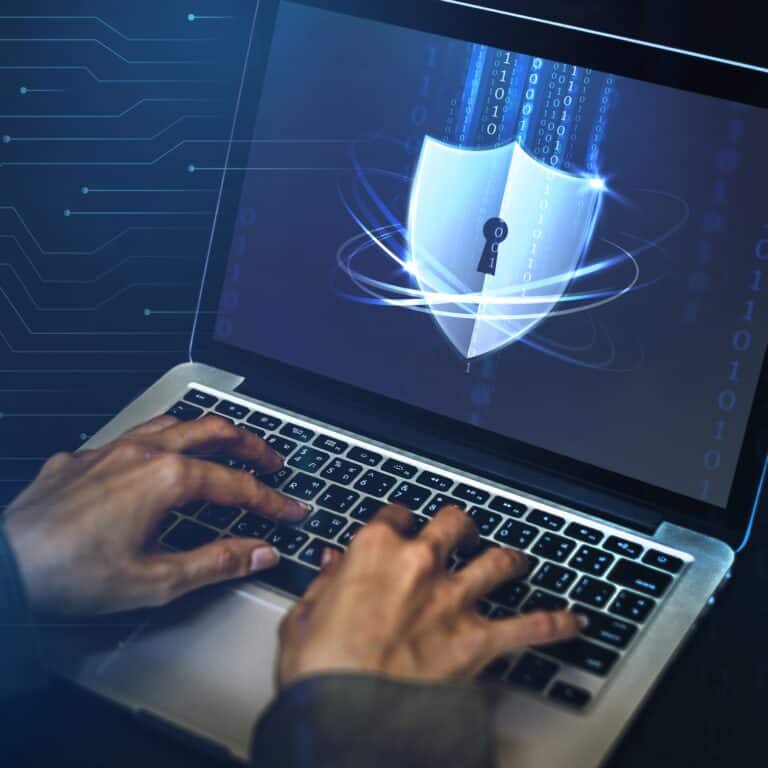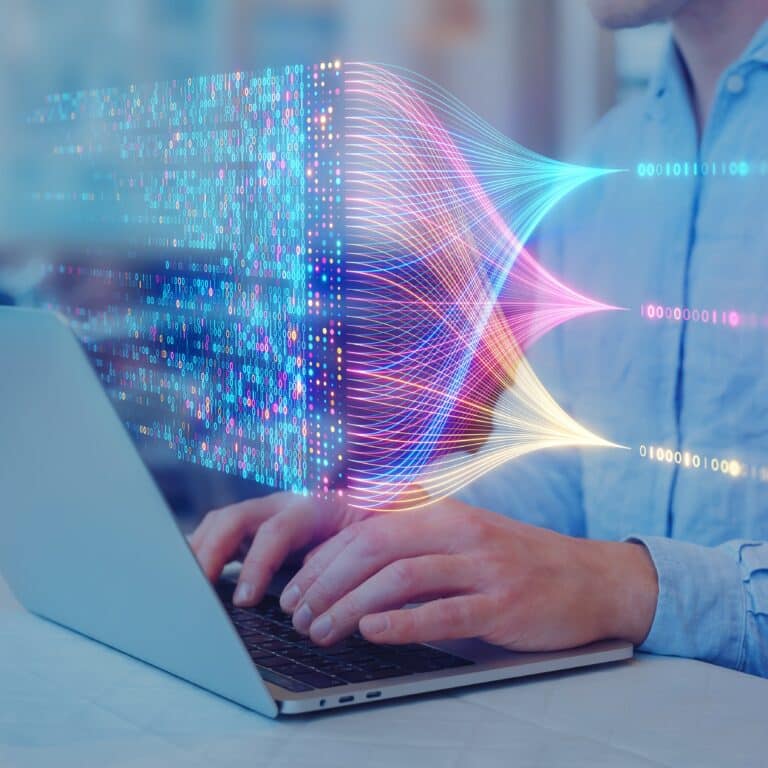Digital Forensics
The Rimkus Digital Forensics practice stands apart through our commitment to scientific rigor, legal admissibility, and client service. We understand that digital evidence often serves as the cornerstone of modern litigation, and we approach each case with the thoroughness and precision it deserves.
Our certified digital forensics experts bring decades of experience from thousands of cases involving digital evidence. We have provided expert testimony in state and federal courts in the United States, as well as in international proceedings. Whether working under strict legal guidelines or tight deadlines, the Rimkus Digital Forensics team can deliver actionable results that move cases forward.
Our team maintains certifications from leading forensic organizations and stays current with rapidly evolving technology and legal standards to ensure our methods remain at the forefront of digital forensics. We recognize the sensitive nature of digital evidence and maintain the highest standards of confidentiality and security throughout our processes. Rimkus experts also regularly teach continuing education programs and contribute to industry knowledge through instruction and publication.
Beyond technical capabilities, we pride ourselves on clear communication with clients, attorneys, and courts. Complex digital evidence requires careful explanation to be understood and accepted. Our experts excel at translating technical findings into compelling narratives that support case strategies and help achieve favorable outcomes.
The Rimkus Digital Forensics team combines technical expertise with legal understanding to provide clients with the evidence they need to build strong cases. Our comprehensive services, rapid response capabilities, and commitment to scientific rigor make us a trusted choice for attorneys, insurance companies, and corporations facing complex digital evidence challenges.
Whether you need emergency evidence preservation, detailed forensic analysis, or expert testimony, Rimkus has the experience and capabilities to support your case from investigation through trial.
Digital Evidence Experts in Trucking Accident Cases
The Rimkus Digital Forensics team has extensive experience consulting on commercial vehicle accident investigations. Our specialized expertise allows us to understand the unique challenges and evidence requirements these complex cases demand. Through thousands of analyses of mobile phones and other electronic devices, we have developed deep knowledge of digital evidence in transportation-related incidents.
Whether examining allegations of distracted driving, verifying driver rest periods, or establishing event timelines, Rimkus has the technical expertise and industry knowledge necessary to help clients uncover the facts in commercial vehicle investigations.
Rapid Response Digital Evidence Preservation
Time is critical in commercial vehicle investigations. Digital evidence can be automatically overwritten, deleted, or lost within hours or days of an incident. Every hour counts when preventing the spoliation of evidence and avoiding negative inferences that can damage a case. Our team understands this urgency and offers rapid response services to help preserve crucial evidence before it disappears forever.
We can extract digital evidence in an expedited manner for our clients by processing a device that has been shipped directly to our secure facility or by dispatching a certified examiner to the driver’s location for on-site device forensic data acquisition.
Our digital forensics experts use forensically sound methods to preserve critical digital evidence while maintaining the chain of custody and admissibility standards required for litigation. Whether the device is personal property or company-issued equipment, we act swiftly to capture the digital footprint that could make or break a case.
Our Digital Forensics Services
Mobile phone forensics involves extracting data from smartphones, including deleted information that traditional phone records cannot reveal. We can recover messages, emails, application data, device interaction records such as screen touches, unlocking patterns, screen orientation changes, and Bluetooth connections, and much more.
For example, device interaction records provide evidence of driver distraction in trucking accident cases by showing when a driver unlocked the device, when and how their fingers touched the phone screen, and whether they were actively manipulating the device versus passively receiving notifications. These timestamped records can pinpoint the precise moment of impact and prove whether a driver was typing a message, scrolling through social media, or adjusting navigation. Screen orientation changes can reveal if drivers were rotating their phones to watch videos or take photos, while Bluetooth connection logs distinguish between hands-free use and manual device handling, creating a timeline that definitively proves or disproves distracted driving claims with precision that traditional phone records simply cannot match.
Our experts use the same advanced technology and methods employed by law enforcement and government agencies to perform comprehensive extractions that go far beyond basic phone bills or Call Detail Records (CDR). We can determine when and how a driver interacted with their device, down to individual screen touches and app usage, providing the precise evidence needed to prove or disprove distracted driving claims. In trucking accident cases, cell phone forensics has become one of the most common and decisive forms of evidence, often revealing critical details that determine case outcomes. Our comprehensive analysis can prove whether a plaintiff was distracted by their own device at the time of impact. By definitively establishing whether the truck driver was or was not using their phone in the moments leading up to the crash, we can provide objective evidence that protects innocent drivers from false claims.

Location forensics examines CDRs, GPS data, and location information from smartphone apps and third-party sources to determine where someone was at specific times. This evidence can corroborate or discredit alibis, establish timelines, and provide crucial context for accident investigations.
Our analysis goes beyond basic mobile phone tower data to include precise GPS coordinates, speed calculations, and movement patterns extracted directly from mobile devices. In many cases, we can determine not just where someone was, but how they got there, how fast they were traveling, and whether their claimed timeline matches the digital evidence.
In commercial vehicle cases, location forensics can verify driver rest periods, establish routes taken, and determine if drivers were where they claimed to be during critical timeframes. This comprehensive location analysis often provides the objective evidence needed to resolve disputes about driver behavior and compliance.

Computer forensics examines computers, laptops, external storage devices, cloud data, and server information to recover digital evidence for legal proceedings. Rimkus experts use sophisticated digital forensics software and hardware to retrieve data even when it has been deleted, encrypted, or damaged.
We maintain strict chain-of-custody procedures and create “perfect snapshots in time” of digital evidence to help ensure admissibility in court while addressing spoliation concerns. Our analysis extends beyond simple data recovery to include comprehensive documentation of user activity, communication patterns, and system logs.
Whether investigating corporate misconduct, insurance fraud, or criminal activity, our Digital Forensics team provides the technical expertise and legal understanding necessary to uncover critical digital evidence.

Modern vehicles store substantial data in their in-vehicle infotainment (IVI) and telematics systems, including GPS locations, call logs, text messages, and connected device information. This digital forensic sub-discipline examines vehicle systems to help investigate accidents and gather evidence related to driver behavior.
Our IVI forensics can reveal data that Event Data Recorders do not capture, which can be especially valuable in low-speed collisions with no airbag deployment, such as accidents involving cyclists and pedestrians. We can determine if drivers were manipulating touchscreen controls, making calls, or using navigation systems during pivotal moments.
This data proves invaluable for comprehensive investigations that involve human factors experts providing distraction analysis and biomechanical engineering experts performing accident reconstruction. As vehicle technology becomes more sophisticated, IVI forensics provides increasingly detailed insights into driver actions and vehicle performance during incidents.

Audio forensics applies scientific methodologies to enhance, authenticate, and analyze audio recordings for legal proceedings. We can clean up recordings to improve intelligibility, verify authenticity, and detect signs of tampering or manipulation.
Our experts use advanced signal processing techniques to filter background noise, amplify speech, and extract maximum value from audio evidence. Whether analyzing emergency calls, surveillance recordings, or smartphone audio, we can often recover previously unintelligible content that proves crucial to cases.
With the emergence of AI-generated deepfakes and sophisticated audio manipulation, authentication has become increasingly important. Our comprehensive analysis can detect digital alterations and provide the technical foundation needed to establish audio evidence reliability in court.

Video forensics involves the scientific examination and analysis of video evidence for legal matters. We can enhance poor-quality footage, authenticate recordings, and conduct frame-by-frame analysis to extract critical details that might otherwise be missed.
Our enhancement techniques can make license plates legible, faces identifiable, and pivotal actions visible in previously unclear footage. To help ensure court admissibility, we can also verify that video has not been tampered with while maintaining strict chain-of-custody procedures.
From dashboard cameras and surveillance systems to smartphone recordings, video evidence has powerful impact on legal outcomes. Our analysis helps reconstruct events, identify individuals, and correlate video evidence with other data sources to build comprehensive case narratives.
The rise of generative artificial intelligence (AI) technology has introduced new challenges in video forensics, as sophisticated deepfake videos and AI-generated content becomes increasingly difficult to distinguish from authentic footage. Our forensic experts employ cutting-edge detection methods to identify AI-generated or manipulated video content by examining compression artifacts, temporal inconsistencies, and other technical markers that reveal digital manipulation. This capability is essential for maintaining the integrity of video evidence in an era where synthetic media can be created with remarkable realism.

Chip-off forensics physically removes memory chips from damaged or locked devices to extract data directly when other methods fail. This advanced technique is reserved for cases where evidence is extremely valuable and standard extraction methods are unsuccessful.
This complex and potentially destructive process requires exceptional expertise in soldering, circuit analysis, and memory chip technology. We employ chip-off forensics only when devices are severely damaged, password-protected beyond other recovery methods, or contain key evidence that cannot be accessed through conventional means.
While invasive, chip-off forensics can recover crucial data from devices that would otherwise be considered unrecoverable, often providing the breakthrough evidence needed to resolve complex cases involving damaged smartphones, tablets, GPS units, or dashboard cameras.


